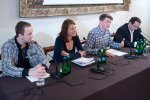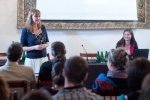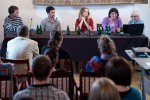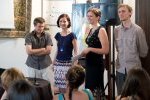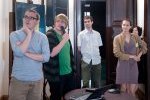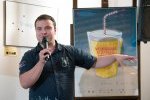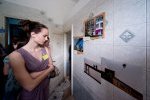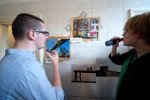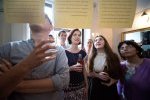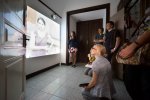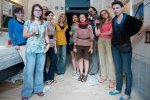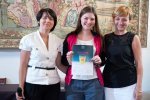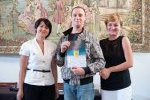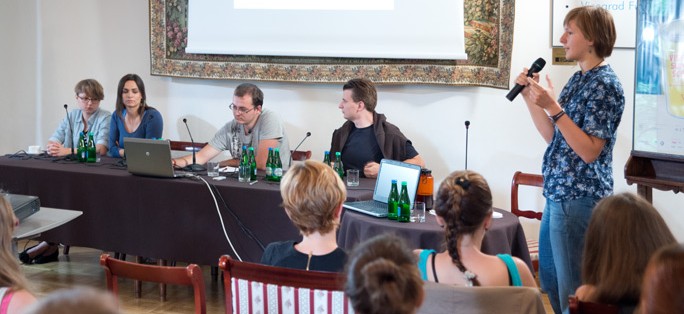
The final day of the 2012 edition of the Visegrad Summer School saw the participants make presentations on the three workshop categories they were assigned to. Beginning with the participants form the Political Identity workshop, all in attendance were treated to some wonderfully creative and innovative presentations that reflected the knowledge and skill of all participants at this year’s event. The presentations varied from the use of video interviews to some eye-catching power point presentations, yet the four presentations from the participants involved in the Political Identity workshop all managed to hold the audiences attention from their opening line. Each group featured participants from a diverse number of nations which only added to the originality and resourcefulness on display from each group. However, the four Political Identity groups would certainly not have been so successful without the guidance and tutelage offered to them by their wonderful tutors Magdalena Góra and Natasza Styczyńska.
The next group to give presentations were the participants involved in the Public Presentations workshop. Once again the standard of presentations from these groups was terrific and all four groups contributed to a memorable day. Each group managed to focus on different topics for their respective presentations which in turn made for four innovative and thought-provoking exhibitions. Anticipating the material of each presentation proved difficult as they contrasted from the humorous ‘’How not to Present’’, to the sensitive ‘’Visegrad cooperation’’. Arguably these four presentations were some of the most creative and intriguing of the entire two week event and each participant involved in their creation deserves credit for producing material such as this. Once again as was the case with the Political Identity workshop, the group could not have exceeded without the assistance of a tutor. In this case, the brilliantly creative Joanna Pająk helped the four groups deliver memorable presentations through her sophisticated approach to assisting each group.
The final workshop to present their production was the group titled Post-Industrial city space workshop. As this group required much instances of photography, it was undoubtedly the most artistic and imaginative of the three workshops on display. However, this group did not conform to giving a standard presentation on their work; instead they opted to open an exhibition highlighting the work done by the participants (artists) during this project. The anticipation around the Villa prior to the opening of this unique exhibition was tangible and prior to the actual opening of the exhibition all in attendance weren’t sure what to expect. However, to the delight and satisfaction of all, the presentation opened to rapturous acclaim and approval. Situated in a unique and contemporary setting, this exhibition showcased the artistic and pioneering talents of all participants associated with the project and it was the highlight of the two week event for many in attendance. The use of inventive imagery and modern surroundings only added to the sense of value that this exhibition left in its wake. Once again the exhibition could not have been feasible without the tireless work of tutor Nikko Biernacka, who utilised all her artistic experience to provide the participants with all facets of her artistic knowledge to aid them in their exhibits.
All three workshops succeeded in elevating the standard of the Visegrad Summer School and this is to the immense credit of all participants at this year’s event. Their creativity and willingness to succeed in whatever challenge they face was both inspiring and significant. Closing the eleventh edition of the Visegrad Summer School, the coordinator of the event Anna Kowalska alongside her Ukrainian colleague Olga Maksymenko summarized their thoughts on what had been a truly ‘’fantastic’’ event. Both woman thanked each participant for their substantial contributions throughout the two week event and wished them the best in their future career paths. Ms Kowalska praised the role of the partners of the event in making it such a success and on behalf of the Villa Decius Association thanked all who had contributed handsomely to the event including; the experts, participants, sponsors and volunteers. Concluding by presenting each participant with a certificate acknowledging their contribution to the two week events, Ms Kowalska reaffirmed the goals of the Visegrad Summer School before once again thanking each participant for their valuable input to this year’s edition of the Visegrad Summer School.
The final workshop to present their production was the group titled Post-Industrial city space workshop. As this group required much instances of photography, it was undoubtedly the most artistic and imaginative of the three workshops on display. However, this group did not conform to giving a standard presentation on their work; instead they opted to open an exhibition highlighting the work done by the participants (artists) during this project. The anticipation around the Villa prior to the opening of this unique exhibition was tangible and prior to the actual opening of the exhibition all in attendance weren’t sure what to expect. However, to the delight and satisfaction of all, the presentation opened to rapturous acclaim and approval. Situated in a unique and contemporary setting, this exhibition showcased the artistic and pioneering talents of all participants associated with the project and it was the highlight of the two week event for many in attendance. The use of inventive imagery and modern surroundings only added to the sense of value that this exhibition left in its wake. Once again the exhibition could not have been feasible without the tireless work of tutor Nikko Biernacka, who utilised all her artistic experience to provide the participants with all facets of her artistic knowledge to aid them in their exhibits.
All three workshops succeeded in elevating the standard of the Visegrad Summer School and this is to the immense credit of all participants at this year’s event. Their creativity and willingness to succeed in whatever challenge they face was both inspiring and significant. Closing the eleventh edition of the Visegrad Summer School, the coordinator of the event Anna Kowalska alongside her Ukrainian colleague Olga Maksymenko summarized their thoughts on what had been a truly ‘’fantastic’’ event. Both woman thanked each participant for their substantial contributions throughout the two week event and wished them the best in their future career paths. Ms Kowalska praised the role of the partners of the event in making it such a success and on behalf of the Villa Decius Association thanked all who had contributed handsomely to the event including; the experts, participants, sponsors and volunteers. Concluding by presenting each participant with a certificate acknowledging their contribution to the two week events, Ms Kowalska reaffirmed the goals of the Visegrad Summer School before once again thanking each participant for their valuable input to this year’s edition of the Visegrad Summer School.

